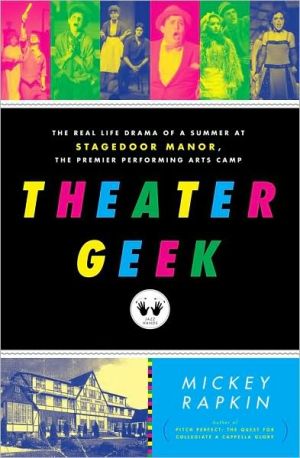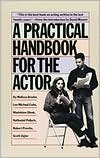Theater Geek: The Real Life Drama of a Summer at Stagedoor Manor, the Famous Performing Arts Camp
What do Natalie Portman, Robert Downey, Jr., Zach Braff, and Mandy Moore have in common? Before they were stars, they were campers at Stagedoor Manor, the premier summer theater camp for children and teenagers. Founded in 1975, Stagedoor continues to attract scores of young performers eager to find kindred spirits, to sing out loud, to become working actors—or maybe even stars.\ Every summer for the past thirty-five years, a new crop of campers has come to the Catskills for an intense, often...
Search in google:
What do Natalie Portman, Robert Downey, Jr., Zach Braff, and Mandy Moore have in common? Before they were stars, they were campers at Stagedoor Manor, the premier summer theater camp for children and teenagers. Founded in 1975, Stagedoor continues to attract scores of young performers eager to find kindred spirits, to sing out loud, to become working actors—or maybe even stars. Every summer for the past thirty-five years, a new crop of campers has come to the Catskills for an intense, often wrenching introduction to professional theater. (The camp produces thirteen full-scale productions during each of its three sessions.) These kids come from varying backgrounds—the offspring of Hollywood players from Nora Ephron to Bruce Willis work alongside kids on scholarship. Some campers have agents, others are seeking representation. When Mickey Rapkin, a senior editor at GQ and self-proclaimed theater fanatic, learned about this place, he fled Manhattan for an escape to upstate New York. At Stagedoor, he tracked a trio of especially talented and determined teen actors through their final session at camp. Enter Rachael Singer, Brian Muller, and Harry Katzman, three high school seniors closing out their sometimes sheltered Stagedoor experiences and graduating into the real world of industry competition and rejection. These veteran campers—still battling childhood insecurities, but simultaneously searching for that professional gig that will catapult them to fame—pour their souls into what might be their last amateur shows. Their riveting stories are told in Theater Geek, an eye-opening, laugh-out-loud chronicle full of drama and heart, but also about the business of training kids to be professional thespians and, in some cases, child stars. (The camp has long acted as a farm system for Broadway and Hollywood, attracting visits from studio executives and casting directors.) Via original interviews with former and current campers and staff—including Mandy Moore, Zach Braff, and Jon Cryer—Rapkin also recounts Stagedoor Manor’s colorful, star-studded history: What was Natalie Portman’s breakout role as a camper? What big-time Hollywood director, then barely a teenager, dated a much older Stagedoor staff member? Why did Courtney Love (at Stagedoor visiting her daughter) get into an argument with a hot dog vendor who had set up shop at the camp? Theater Geek leads readers through the triumphs and tragedies of the three senior campers’ final summer in an absorbing, thought-provoking narrative that reveals the dynamic and inspiring human beings who populate this world. It also explores what the proliferation of theater camps says about our celebrity-obsessed youth and our most basic but vital need to fit in. Through the rivalry, heartbreak, and joy of one summer at Stagedoor Manor, Rapkin offers theater geeks of all ages a dishy, illuminating romp through the lives of serious child actors. Rich, insightful, and thoroughly entertaining, Theater Geek pulls back the curtain on an elite and intriguing world to reveal what’s really at its core: children who simply love to perform. Publishers Weekly Stagedoor Manor is famous in the performing arts community for transforming young unknowns into the likes of Natalie Portman and Robert Downey, Jr., two previous participants. Rapkin, a senior editor at GQ, follows three campers as they rehearse for major roles in Sondheim shows and recounts the camp’s storied history, complete with anecdotes of overly-dramatic directors and lax adult oversight fueled by sex and drugs (far more entertaining that any of the present-day shenanigans). Although Rapkin has obviously spoken frequently with each of his chosen subjects, he neither delves into their stories, nor questions the outlandish things they say. Indeed, one girl’s rivalry with another veteran camper is presented with such gravity that it almost seems... important. Then the reader recalls that this was on a one-day production put on by teens in a Pennsylvania forest. Theatre is a powerful force, but Rapkin rarely explores beyond the proscenium. Instead, he embraces the relationship between Stagedoor and the industry with little question, leading one to wonder what the campers who didn’t land the lead, or the agent, might have to say about all this. (June)
Theater Geek\ The Real Life Drama of a Summer at Stagedoor Manor, the Famous Performing Arts Camp \ \ By Mickey Rapkin \ Free Press\ Copyright © 2010 Mickey Rapkin\ All right reserved.\ ISBN: 9781439145760 \ \ \ CHAPTER 1\ \ It's showtime\ IN THE COZY LOBBY OF WHAT WAS ONCE A CATSKILLS HOTEL, nearly three hundred children sit, crammed in and anxious. It is day three at Stagedoor Manor, and in just a moment these campers will learn which roles they'll play in one of the thirteen shows to be produced in the next three weeks. And the wait—the interminable wait!—will be over.\ The vibe in the wood-paneled room is tense, the subtext of every conversation: God, I hope I get it. Campers flit about. Some sing aloud to themselves as they walk. The kids refer to this unconscious vocal expression as “singing Tourette's,” acknowledging that while the humming is certainly annoying, no one in this situation could reasonably be expected to control the sound any more than someone suffering from Tourette's syndrome could be expected to silence his outbursts. When theater geeks get anxious they also tap-dance. The actor Sebastian Stan (Gossip Girl) was a camper here not too long ago. He describes that moment when the cast lists go up. “It's nerve-racking,” he says. “It's that same nervous adrenaline you find later in life after a professional audition, when you're waiting for that miracle phone call.”\ Stagedoor Manor campers have been known to cry on these mornings—both tears of joy and those born from seemingly life-ending disappointment. The musical's the thing. But not everyone can be cast in that session's hot show. “At Stagedoor, I was cast in The Utter Glory of Morrissey Hall,” says Mandy Moore. “I think it was produced on Broadway once. It closed during intermission.” (Actually, The Utter Glory of Morrissey Hall—a musical about a British headmistress, so popular at Stagedoor because it has an abundance of female roles—played seven previews and one performance on Broadway in 1979 before abruptly shuttering.)\ The big show this session is still a secret. All thirteen titles are. And for three days these would-be thespians speculate, needle, debate. In an effort to rustle up some information on the still top-secret program, they badger the weaker staff members, pleading: “Just tell me what show you're directing.” In fact, the anticipation was so terrible in 2009 that the night before the shows were revealed the entire camp was shipped off to the Middletown Mall to the movies. The off-grounds escape was meant to distract from the anxiety— How many people does he need?—not that it helped. “We talked about the shows the entire bus ride,” says Rachael Singer, eighteen, who was beginning her final summer at Stagedoor. Over breakfast, on the morning the cast lists were to be posted, Rachael sat in the back of the cafeteria plainly nervous, mindlessly twisting a black hair tie in her hand and barely touching her food. If her friend Harry Katzman was similarly anxious, you wouldn't have known it by looking at his plate. It was licked clean.\ Harry Katzman, eighteen, has dark curly hair, the ample physique of Zero Mostel, and the nearly translucent complexion of someone who spends an awful lot of time indoors. Two days earlier, walking into the lobby on the first day of camp, he was dressed in a striped T-shirt and pale blue jeans rolled up to the calf. He entered the space like Eva Per?n in Evita, beckoning the peasants to him. Small girls approached Harry. Former co-stars and assorted hangers-on wrapped their arms around his body and hugged him tightly.\ Harry is something of a celebrity at Stagedoor Manor—a teenager renowned for his rich voice, his good humor, and his always-reliable gossip. Justin Mendoza, one of the camp's music directors (he studied at the University of California?Irvine and spent three years as the associate music director at San Francisco's famous revue Beach Blanket Babylon), remembers meeting Harry in 2006. “Harry used to come up to me, grab my hand, and interlock our fingers,” Justin says. “Then he'd want to gossip.” Never shy, Harry fancied himself a musical theater expert—the cast albums on his iPod are sorted by West End versus Broadway company—and he thought nothing of handing out his unsolicited opinions to the camp's artistic staff. In 2006, Stage-door's Raymond Zilberberg directed a production of Company, Stephen Sondheim's musical about open marriages and a lonely bachelor. As rehearsals began, Harry pulled the director aside and offered to lend him a DVD of the celebrated 1996 Donmar Warehouse production of Company, which Harry said had “some ideas I could borrow,” Raymond recalls, shaking his head in loving disbelief.\ Harry rarely keeps his thoughts to himself. On the first day of his first summer at Stagedoor Manor, Harry joined a conversation of returning campers who were busy discussing their audition songs. The boy to Harry's left said he was planning to sing “Dancing Through Life,” from Wicked.\ “I made a face,” Harry admits. “I was such a jerk.” For his part, Harry sang “Luck Be a Lady,” from Guys & Dolls. Not exactly an inspired choice, he admits now. “But at least it was traditional!” If Harry came across, shall we say, strong, that summer, he had an excuse: “I was among my people for the first time.”\ Harry comes to Stagedoor from Columbia, South Carolina. And he is, in many ways, the archetypal Stagedoor theater geek—a smalltown boy with an expressive personality who loves theater and finds a second home in Loch Sheldrake. Harry's mother, Debbie Katzman, does not mince words. “Stagedoor was Harry's savior,” she says, preferring to leave it at that.\ Harry wasn't always a star at camp. He'd turned in reputable performances before, notably as Th - nardier in a 2006 production of Les Mis - rables. In a 2007 staging of Grand Hotel, Harry played Hermann Preysing, manager of a struggling textile mill who commits rape in act two. Harry's onstage verisimilitude was frightening. “He creeped us out!” says Konnie, the camp's production director and associate producer. Harry agrees with her assessment of his very fine work in Grand Hotel. After that show, he says, “people would legit not talk to me.”\ But nothing prepared the camp for Harry's turn as the Chairman in 2008's The Mystery of Edwin Drood. This lesser-known musical— not seen on Broadway since 1985—is a comedy of mistaken identities and murder, and the role of the Chairman is crucial to any production's success. First, it's the Chairman's responsibility to set the tone for the evening, encouraging the audience to be (as the script indicates) as “vulgar and uncivilized as legally possible.” But the actor must also memorize reams of dialogue, not to mention craft an entirely separate role for the second act's play within a play. Yet, in a cast of Stagedoor Manor superstars, Harry put Drood in his back pocket and walked away with it. When he commanded, the audience laughed. Yet with a quick turn of his hand, he could inspire dead quiet. He pulled this performance off in three weeks—from a standing start? Dang, kid.\ After The Mystery of Edwin Drood, Nancy Carson, a well-known New York talent agent who regularly scouts at Stagedoor, approached Harry. So did a rep from the talent agency Paradigm. “I got carded for the first time,” Harry says. Business cards, he means. As in “Stay in touch, kid. Let's work together.” “It was flattering,” Harry says, but also frustrating. “Nothing came of it. I live in South Carolina. I couldn't afford to fly to New York for auditions.”\ This display (otherwise thrilling) was another reminder of how geographically undesirable Harry was. There's not a lot going on for aspiring actors in Columbia, South Carolina, after all. During the winter months, Harry would sit up late at night—on e-mail, on iChat—living his life through a computer screen. He'd listen to stories from his Stagedoor friends, many of whom lived close to Manhattan, who were already auditioning for professional work. One of Harry's friends (spotted at Stagedoor by an agent) was up for the Meryl Streep film It's Complicated and then for the 2009 Broadway-bound revival of Brighton Beach Memoirs. Another Stagedoor contemporary, Aaron Albert (who'd understudied the lead in the musical 13 at the Mark Taper Forum in Los Angeles in 2007), auditioned for Brighton Beach Memoirs but didn't get the part, either. In the end, that role went to yet a third Stagedoor Manor camper, Noah Robbins, a phenom who's been dancing with Debbie Allen since he was six years old. Harry, at home in South Carolina, didn't begrudge his friends their success. But at times, listening to their industry talk left him frustrated and feeling further isolated.\ There wasn't a soul in Columbia who didn't know Harry wanted to go to the University of Michigan. Harry had made that much perfectly clear. In recent years, under department chairman Brent Wagner, Michigan's musical theater program had become arguably the best in the country. Recent Michigan alums include Gavin Creel (a Tony nominee for the 2009 revival of Hair), Alexander Gemignani (Valjean in the recent Broadway revival of Les Mis - rables), and Celia Keenan-Bolger (The 25th Annual Putnam County Spelling Bee). Admission to Michigan's program is a near impossibility: six hundred students apply annually for twenty spots. Undeterred, in his senior year of high school Harry flew to Ann Arbor with his mom for the audition, which included two songs, a monologue, and a dance combination. “I don't dance,” Harry admits. “I fance. I'm a fancer. I fake dance.” Really? “I'm terrified of dancers,” he says. “They can kick their face!” Still, Harry smiled through the choreographed portion of the morning, making his way across the stage, hoping some well-played jazz hands might distract the committee from his two left feet.\ Eighty people auditioned for Michigan that day. Of those eighty, Harry Katzman was the only one accepted.\ And yet.\ Harry reflects on careerism and on a curious sentiment bubbling up among his peers—a generation reared on Hannah Montana and American Idol. “I feel like I may have missed out,” Harry says. “These thoughts go through my head. Why don't people know me yet? Why don't I have an agent? Maybe I could have been on a Nickelodeon show. I've never had stage parents to make it happen. I'm doing this on my own.” Brian Muller, eighteen, is something of an anomaly at Stagedoor Manor. For one thing, his iPod is more Jay-Z than (Tony nominee) Jayne Houdyshell. Also, he's athletic.\ Nearly six feet tall, with good hair and good teeth, Brian grew up on the Upper West Side, and he possesses that particular air of bravado that only comes from a childhood spent treating Manhattan as your own backyard. During his first summer at Stagedoor Manor, when Brian was eleven years old, he spotted a bunch of the older boys playing basketball on the camp's one-rim half-court. Brian ran at a clip to join them. But he was disappointed to find, upon closer inspection, that this was an ironic contest. “They were playing basketball,” Brian says, “but as a joke. Like, Ha ha, Stagedoor kids playing sports.” Brian grabbed the ball and shot a few from outside the key. He didn't make a single basket. “But at least I hit the rim,” Brian says. “The other kids looked at me and were, like”—accusatorily—“?Why are you good at basketball?'”\ There's a famous scene in A Chorus Line where a young man steps forward to explain how he first started dancing. He says it began when he followed his sister to class one day. “I'm watchin' Sis go pitterpat,” he sings. “Said, I can do that, I can do that.” That, in a lyric, is how Brian Muller wound up at Stagedoor Manor. Visiting his sister at camp years ago, he'd stumbled into the Stagedoor lobby, his eyes suddenly immense. He then spent the next ten months pleading with his parents to send him to theater camp. The Mullers were, to say the least, surprised by their son's sudden interest in the arts. At that young age the only thing Brian ever wanted to be was a professional golfer. Brian's father worked in the kitchen design business and certainly never expected this from his son. “My dad wasn't listening to Patti LuPone records at night,” Brian says. Brian's childhood friends were, likewise, somewhat alarmed. “We all went to sports camp,” says his classmate Billy Greene. “We thought theater camp was weird.”\ Weird or not, the Mullers consented, enrolling their son for one three-week session in the summer of 2002. That was all it took. Brian fell in love with the place and, really, with the discipline of acting. And what started as a silly summertime adventure somehow snowballed into something more vocational. At twelve or thirteen, an agent picked Brian out of a Stagedoor rehearsal. She wanted to see him in New York when camp let out. But the Mullers hesitated. “What did we know about agents?” says Brian's mother, Nancy, now a communications officer at Bank of America. The Mullers waited to call longer than most parents of aspiring young actors would have. Finally they went to see this woman in her Manhattan office, where she asked Brian to sing a song and read a scene. “We can take this as slow as you want, or as quickly as you want,” the agent told Brian's parents.\ And so it began. Brian went on an audition for a Tostitos commercial, the one about kids at a slumber party. (“Shhh! Get the Tostitos,” Brian had to say.) He went out for an independent film where he'd play identical twin brothers, one of whom gets killed in a fire. No luck there, though he did land a role in the workshop of a new musical, Pages, the story of a thirteen-year-old aspiring pornographer. What does Brian remember about that period in his life? The casting directors? The waiting rooms? The rejection? No. “When I smile,” Brian says, “my left eye is smaller than my right. So in my first head shots, it looked like I had a lazy eye.”\ Brian returned to Stagedoor Manor every summer since that first and found his niche despite being something of a minority, both in athletic ability and attitude toward the dramatic. For example, in 2008, he starred in a Stagedoor Manor production of the southern drama Dark of the Moon, a sort of backwoods Romeo and Juliet about a girl in love with a witch-boy. In a beautifully affecting final scene, Brian cradled his co-star, Morgaine Gooding-Silverwood, in his arms as she lay dying. Unfortunately, when he laid her down, he placed her too close to the footlights, and her dress started to smoke. Midscene, the actress cracked one eye and whispered: “Am I on fire?”\ “Yes,” Brian replied stomping out the flames with his fist, before finishing the scene, to wild applause. Meanwhile, his co-star, a wonderfully talented actress, was inconsolable. “I was angry with myself for breaking character,” she said.\ “You were on fire!” Brian shouted in response.\ Despite years of acting at home and at camp, when it came time to apply to college, Brian's mother Nancy was surprised her son homed in on Bachelor of Fine Arts programs. “As a kid, he'd leave an audition,” she says, “and I'd ask him, ?How did it go?' He'd mumble, ?It was fine.' And that was it.” Was it inertia carrying her even-tempered son through? “I mean, a BFA?” she asks. “What is that?” Brian's father convinced her that their son should at least apply to these programs. Though he probably wished his boy had chosen a more stable profession, “he's excited that I have a path,” Brian says.\ Brian's friends, that athletic bunch from Manhattan's Trevor Day School who'd initially deemed theater camp “weird,” were likewise now on board. “I think Brian's agent used to work with Britney Spears,” Billy says. “That's legit!” And they've come to embrace their friend's potential stardom. They even have a nickname for him: Vince. “Like on Entourage,” Brian says, smirking. On that HBO series, Vince is the big Hollywood stud and a true ladykiller. It's not exactly a stretch. At Stagedoor in 2009, there was a teenage girl who admitted that the only reason she was there for session one was that Brian was coming for session one. The girl switched her own plans, she says, “for the chance to kiss Brian.” (Except she didn't say “kiss.”)\ In the spring of his senior year, Brian was accepted into the prestigious acting program at Carnegie Mellon University. And he immediately took on the lax attitude of a high school senior with the next four years locked up. “I was going to Carnegie Mellon,” Brian says. “I thought, It's senior year and I can chill out. I'll go to college and it'll be awesome.”\ But in the same way that fate intervened when Brian, a ten-year-old aspiring golfer, stumbled into the Stagedoor lobby to visit his sister, once again some larger force would give Brian a nudge. It was around the time that his acceptance letter to Carnegie Mellon showed up that Brian auditioned for the national tour of Little House on the Prairie, a new musical starring Melissa Gilbert. A dance audition and a subsequent callback followed for Brian; and then a waiting game.\ One spring night, he came home to find his parents and his sister seated at the kitchen table. Brian's father looked angry. “Did you leave my bedroom door open?” he asked. “Because the dog peed in my room—”\ Brian: “I'm sorry, I thought it was closed.”\ Dad: “—and you got the job.”\ Elation. For the next hour, the family discussed logistics. The Little House on the Prairie company would start rehearsals in August 2009 before departing on a twenty-six-city national tour. Brian wondered if his parents would let him defer college. Was it even their decision to make? His dad, as rational as he'd always been, laid it out: “If this happened four years from now, after graduation, this would be the greatest thing, right? So why not do it?”\ This was to be Brian's eighth (and last) summer at Stagedoor Manor. He is caught between two worlds, that push-and-pull between childhood and what comes next. It's all moving a bit quickly, isn't it? Graduation. A role in a national tour. He's heard about life on the road—and how lonely it can be. Too much free time. A different city every few weeks. In quiet moments, he worries: Would life ever be as good as this summer again? Surrounded by his best friends? Girls returning to camp simply for the chance of catching his attention? Couldn't he just hit pause and linger for a minute? Was he ready to be a working actor?\ On day one at Stagedoor Manor 2009, the child in Brian wins out. Eighteen, handsome, with a helmet of brown hair, Brian stands at the lobby piano, leading a particularly spirited round of “Giants in the Sky,” from the Sondheim musical Into the Woods. This particular song concerns Jack (of the beanstalk) and his adventures in the cloud kingdom where he meets a giant and his wife. In Brian's hands today—as befits his personality—the song takes on a slightly different meaning. When Brian sings the lyric, “She gives you food and she gives you rest / She holds you close to her giant breast,” he shouts “breast!” and seems very pleased with himself for being so clever.\ What role would Brian play this session, his last at Stagedoor Manor? He had no clue. He wasn't even sure if he'd be in a musical or a drama. He circled “either” on his form, letting the camp decide, happy to put his faith in the system. Konnie—the head of the casting committee, a onetime actress and costume designer from the Smokey Mountains of Tennessee who has worked at Stagedoor for more than two decades—certainly knew him well enough to make that decision. She had something in mind for Brian. She had something in mind for everyone, as Rachael Singer would soon find out.\ “The first two days at Stagedoor are the worst,” Rachael Singer says.\ Rachael, eighteen, is seated outside the camp's Playhouse Theater (once the hotel's disco) at 9P.M. on day one, waiting to audition for the casting committee. It's an unseasonably chilly night, and she is wearing a black cotton dress, with a blue tie-dyed scarf wrapped around her neck. She shivers a bit, clutching a Styrofoam cup of tea. “Throat Coat!” she says, identifying her favorite brand of herbal elixir. “It's all we drink at Stagedoor.”\ Rachael, just five feet tall (“and a half!” she adds), with brown hair that falls an inch below her shoulders, is joined by the oldest girls at camp; each holds the sheet music for her audition, rustling the pages to relieve her nerves. As William Goldman writes in his landmark book The Season, “Auditions are degrading, humiliating, ineffective— and the best system yet invented for casting a play.”\ “I can't wait to get this over with,” Rachael says.\ Rachael might be short in stature, but her height is diametrically opposed to the size of her voice (the tremors she produces could raze buildings). Her father, a lawyer in Palm Beach Gardens, Florida, remembers the first time he heard his daughter sing. “When Rachael was eighteen months old,” Mike Singer says, “we were in the car driving from Vermont to Montreal. The radio was on. Rachael's sitting in the back, singing along to ?Hey, Jude.' I couldn't believe it.” And the girl never stopped. At age three she would dance around the house mimicking songs from Fiddler on the Roof. At five years old her dad looked into voice lessons. “It was tough to find a coach who would give voice lessons to a five-year-old,” he says. Especially in South Florida. Meanwhile, Rachael's mother, Amy, is a speech pathologist, and she was concerned that intensive lessons at such a young age might damage her daughter's vocal cords. But after some due diligence, the classes were arranged. Parents often enroll their girls in ballet at the age of five, her father reasoned, so why not voice?\ Growing up in the Sunshine State presents its own challenges for a would-be actress, but Rachael's parents did what they could. The girl performed with the Lakeworth Players, a community theater. If some nearby organization needed an adorable moppet to sing the National Anthem, Rachael was there. When her aunt died of complications related to diabetes, Rachael got involved with the Diabetes Research Foundation, singing at benefits whenever possible. In middle school, she opened for KC & the Sunshine Band. She sang for Donald Trump at The Mar-a-Lago Club in Palm Beach.\ As a young teenager, she auditioned for the Dreyfoos School of the Arts, a magnet program forty-five minutes from home. Rachael's voice had developed a bluesy quality. And in the eighth grade, a teacher there pulled her aside to ask, “You do know you're not black, right?” Rachael loved the school, yet even in an intensive arts program, she never quite felt as if she could discuss her ambitions with her classmates. If she had an audition or an extracurricular performance, she sometimes told her friends that she had a family commitment that weekend, rather than go into detail and further separate herself from the pack. If Rachael had a complaint it was this: some of the students at Dreyfoos lacked a significant work ethic. No one at Stagedoor Manor questioned Rachael's work ethic.\ For her first Stagedoor audition in 2006, Rachael sang “When You Got it, Flaunt It,” from The Producers. It's the song that introduces the Swedish secretary, Ulla Inga Hansen Benson Yansen Tallen Hallen Svaden Swanson; Uma Thurman played the part in the 2005 film. “The character is tall, blonde, Swedish, and beautiful,” Rachael says. “Everything I'm not.” (When Rachael utters this, over lunch before camp begins, her mother shakes her head, giving her daughter a troubled look, one that says I've heard this before, one that pleads, Why can't you see what I see?)\ “I'm not legally a midget,” Rachael adds. “At least there's that.”\ It is a hallmark of teenage years to feel betrayed by one's body. But this kind of insecurity is compounded for young actors, Rachael concluded. In the summer of 2008, the casting director for the Jason Robert Brown musical 13, a then-Broadway-bound show about middle school brats in the Midwest, showed up at Stagedoor Manor to audition select campers. Rachael had three callbacks before she was cut. “Too old,” the casting director wrote next to her name (on a piece of paper the girl was never meant to see). Too old? “Sweetie!” Konnie said, pointing to Rachael's chest. It wouldn't be the last time she heard that. When a scout for Broadway's Spring Awakening came to Stagedoor, Rachael auditioned but was labeled “too developed.” Well, that was that. Over the winter, she worked hard to lose fifteen pounds, not an insignificant sum for a compact frame—much of it coming off the top.\ If the professional opportunities weren't exactly panning out, they certainly kept coming. In 2008, Stagedoor Manor put up a production of Andrew Lippa's The Wild Party, a gem about two vaudeville performers on a cocaine-fueled bender in Manhattan. Lippa's musical (based on a Roaring Twenties poem by Joseph Moncure March) premiered off-Broadway in 2000, and while it has since been produced regionally and at colleges, Stagedoor's production would be the first licensed to teenagers. The composer himself doubted that such a risqu - show as The Wild Party would be palatable for high school students, or really, the parents of high school students. But Konnie pursued the rights aggressively and, along with the camp's head of music, Jamie Mablin, worked closely with the composer himself and representatives from Music Theatre International to tailor the content.\ In The Wild Party, Rachael was cast as Mae, the petite, bubbly bride of a dim-witted boxer played by a camper who was at least two heads taller than her, which was part of the joke. Dressed in a purple 1920s dress, her dark hair tucked under a platinum wig, Rachael was a revelation, cavorting around the stage with her man. “Show'em your muscles!” Rachael shouted, in a high-pitched squeak. “Show 'em your muscles!”\ Lippa, whose next show, The Addams Family, was scheduled to open on Broadway in 2010, happened to be in the audience that afternoon. A lightbulb went off. He was working on a new musical, Man in the Ceiling, for Disney Theatricals and was in the midst of casting that show's workshop. Might this five-foot-nuttin' girl be right for the obnoxious older sister? And so, in the fall of 2008, Disney's Jennifer Rudin called Rachael and invited her to come to New York to audition for Lippa and Thomas Schumacher, the president of Disney Theatricals. There was a caveat, though. Before Disney went down this road, they'd need a commitment from Rachael's family. If the girl got the part, they'd agree to relocate to New York for the duration of the production, however long that might be. Rachael would have to leave high school (in her senior year, no less) and be tutored in Manhattan. Her parents discussed it. Dropping out of school? Uh, okay. Who would move with her? Could one of them even afford to quit their job? And what of Rachael's two younger siblings? Still, the opportunity was too good to pass up. Rachael and her father flew to New York in October 2008 to audition for Man in the Ceiling.\ She didn't get the job.\ Though just eighteen, Rachael is already brutally aware of how tough this business can be. She is young enough to have a favorite sweatshirt (a Day-Glo yellow item she's convinced is infused with magic restorative powers) yet mature enough to have someone with the keys to her career insinuate she's too busty. “I'm trying to figure out where I fit,” Rachael says. “What my type is.” At five feet tall, she reasons, she's not quite an ing - nue, but more likely a character actress. In the fall of 2009, Rachael was scheduled to enroll at the esteemed Boston Conservatory to study musical theater. But the great character roles don't come around for an actress until her thirties—if then. Did she have the resolve to stick it out? To fight?\ “I'm always doubting it,” Rachael says. “I'm always terrified of the rejection. I don't know.” Her father shares similar concerns. “I worry every day,” he says. “Are we making the right decision?” Tuition and expenses for one year at The Boston Conservatory can run to $60,000. “The job prospects are not good,” Mike Singer says. “The economics don't make sense. But I believe in her talent. And I want to give her that shot.”\ On that first night of camp, shortly before 11 P.M., Rachael steps out on the Playhouse stage to sing for Stagedoor's casting committee. It's dark in the 300-seat theater. Looking out into the audience, Rachael can see little more than shadows cast by the piano lamp. She chose sixteen bars of “With One Look,” from Andrew Lloyd Webber's Sunset Boulevard. Tonight, it's not Rachael's best work. She flubs the lyrics, making something up on the fly. While her tone is clear, that's about all one can say of the audition. And Rachael, dazed and excused, takes the sheet music back from the piano player and shrugs, as if to say, “What was that?” before exiting stage right.\ But the performance wasn't the problem. Konnie has known Rachael for close to five years, and is well aware of her talent. From Konnie's perspective, the problem is the song Rachael chose. Barbra Streisand often performs “With One Look” in concert, and this only confirmed Konnie's suspicions. “Rachael thinks she's Fanny Brice,” Konnie says, referencing the awkward, offbeat heroine of Funny Girl. “Rachael is content to play short Jewish girls for the rest of her life.”\ And that won't do.\ No, Konnie has her own plans for Rachael. Perched in front of the casting chart—an oversized piece of oak-tag listing every major role up for grabs that Stagedoor session—Konnie picks up her pencil and writes the number 150 in one of the small squares.\ “Sometimes the numbers move,” Konnie says. “But this one will stick.”\ © 2010 Mickey Rapkin\ \ Continues...\ \ \ \ Excerpted from Theater Geek by Mickey Rapkin Copyright © 2010 by Mickey Rapkin. Excerpted by permission.\ All rights reserved. No part of this excerpt may be reproduced or reprinted without permission in writing from the publisher.\ Excerpts are provided by Dial-A-Book Inc. solely for the personal use of visitors to this web site. \ \
Prologue 1Chapter 1 It's Showtime 19Chapter 2 Beginners Showcase 36Chapter 3 Week One 48Chapter 4 Jock Romano 75Chapter 5 Week Two 103Chapter 6 Carl and Elsie 122Chapter 7 Hell Week 150Chapter 8 Performance Weekend 177Epilogue 195Acknowledgments 209Index 211
\ Publishers WeeklyStagedoor Manor is famous in the performing arts community for transforming young unknowns into the likes of Natalie Portman and Robert Downey, Jr., two previous participants. Rapkin, a senior editor at GQ, follows three campers as they rehearse for major roles in Sondheim shows and recounts the camp’s storied history, complete with anecdotes of overly-dramatic directors and lax adult oversight fueled by sex and drugs (far more entertaining that any of the present-day shenanigans). Although Rapkin has obviously spoken frequently with each of his chosen subjects, he neither delves into their stories, nor questions the outlandish things they say. Indeed, one girl’s rivalry with another veteran camper is presented with such gravity that it almost seems... important. Then the reader recalls that this was on a one-day production put on by teens in a Pennsylvania forest. Theatre is a powerful force, but Rapkin rarely explores beyond the proscenium. Instead, he embraces the relationship between Stagedoor and the industry with little question, leading one to wonder what the campers who didn’t land the lead, or the agent, might have to say about all this. (June)\ \ \ \ \ Library JournalRapkin (Pitch Perfect: The Quest for Collegiate A Cappella Glory) provides a lighthearted look inside Stagedoor Manor, the renowned performing arts camp in New York's Catskills, which has been a training ground for many luminaries of the stage and screen. A more accurate title for this book would have been Musical Theater Geek, as Rapkin is clearly far less interested in nonmusical drama. He explores the colorful history of the camp, providing anecdotes about its famous and infamous alumni—a diverse lot, including stars Natalie Portman and Zach Braff and playwright Nicky Silver. Rapkin wisely personalizes his tale by focusing on three promising campers during their last summer; this provides dramatic momentum, as the reader is anxious to learn the fate of these performers on opening night. VERDICT Given the popularity of Fox's Glee, this title should find many fans among teens pursuing careers in the performing arts as well as musical theater aficionados. [For more books for Glee lovers, see "Gleeful Reading" on LJ's ShelfRenewal blog, bit.ly/bJdYhu.—Ed.]—Katherine Litwin, Donors Forum Lib., Chicago\ \







